Question
Patented Products is considering changing its capital structure. Patented currently has no debt and no preferred stock, but it would like to add some debt
Patented Products is considering changing its capital structure. Patented currently has no debt and no preferred stock, but it would like to add some debt to take advantage of the tax shield. Its investment banker has indicated that the pre-tax cost of debt under various possible capital structures would be as follows:
| Debt ratio (wd) | Equity ratio (we) | Debt/Equity ratio | B-T cost of debt |
| 0.0 | 1.0 | 0.0 | 6.0% |
| 0.10 | 0.90 | 0.1111 | 6.4 |
| 0.20 | 0.80 | 0.2500 | 7.0 |
| 0.30 | 0.70 | 0.4286 | 8.2 |
| 0.40 | 0.60 | 0.6667 | 10.0 |
Patented uses the CAPM to estimate its cost of common equity, rs, and at the time of the analysis the risk-free rate is 5%, the market risk premium is 6%, and the companys tax rate is 25%. Patented estimates that its beta now (which is unlevered since it has no debt) is 0.8. Based on this information, what is the firms optimal capital structure, and what would be the weighted average cost of capital at the optimal capital structure?
Step by Step Solution
There are 3 Steps involved in it
Step: 1

Get Instant Access to Expert-Tailored Solutions
See step-by-step solutions with expert insights and AI powered tools for academic success
Step: 2

Step: 3

Ace Your Homework with AI
Get the answers you need in no time with our AI-driven, step-by-step assistance
Get Started


